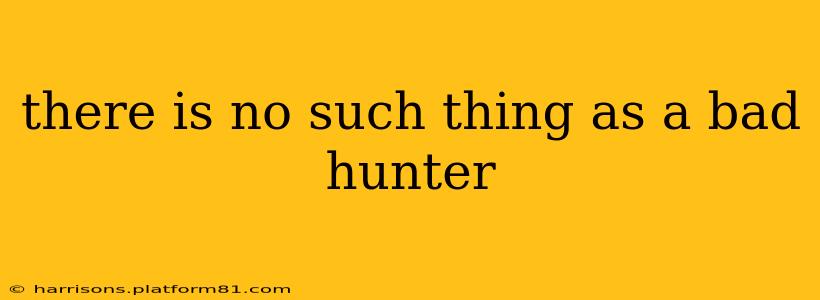There Is No Such Thing as a Bad Hunter: A Deeper Look at Hunting Ethics and Skill
The statement "there is no such thing as a bad hunter" is provocative. It's not literally true, as some individuals clearly lack the skills, ethical considerations, or respect for the environment necessary for responsible hunting. However, the phrase hints at a deeper truth about the hunter's journey – the continuous pursuit of improvement and ethical conduct. This post delves into what constitutes a "good" hunter and examines common misconceptions.
What Makes a Good Hunter?
A good hunter is more than just someone who brings home game. It’s a combination of skills, ethical considerations, and respect for the environment. Let's break down the key elements:
-
Marksmanship and Tracking Skills: Accurate shooting is paramount to ensuring a quick and humane kill. This requires consistent practice and a deep understanding of ballistics, weapon handling, and shot placement. Effective tracking is crucial for locating and ethically harvesting game, minimizing the animal's suffering.
-
Understanding of Wildlife Biology and Behavior: Knowing the animal's habitat, feeding patterns, and social structure allows for ethical hunting decisions. It involves understanding the impact of harvesting on the population and the ecosystem.
-
Respect for the Environment: Leaving no trace, properly disposing of waste, and respecting the land are vital components of responsible hunting. Good hunters understand their impact on the environment and strive to minimize it.
-
Ethical Considerations: This includes following all regulations, respecting the animals, and utilizing the entire harvest responsibly. This also involves understanding and adhering to fair chase principles. A true hunter values the life taken and uses it with respect.
-
Continuous Learning: Hunting is a lifelong journey of learning and skill development. Good hunters are constantly seeking to improve their skills, knowledge, and ethical practices.
Is it Ethical to Hunt?
This is a frequently debated question. While some oppose hunting on ethical grounds, many argue it plays a crucial role in wildlife management and conservation. Responsible hunting can:
-
Control Overpopulation: In some areas, hunting helps control animal populations to prevent overgrazing and habitat destruction. This contributes to the long-term health of the ecosystem.
-
Generate Revenue for Conservation: Hunting licenses and taxes on hunting equipment often fund conservation efforts and habitat preservation programs.
-
Provide Food: For many, hunting provides a sustainable and healthy source of food.
What about Hunters Who Wound but Don't Kill?
This is a crucial point. A hunter who wounds an animal without a clean kill demonstrates a lack of skill and ethical consideration. It's a failure in marksmanship, tracking, or both. This is a stark example of a hunting practice that needs improvement. A true commitment to ethical hunting means continually working to improve skills to avoid such scenarios.
How Can Hunters Improve Their Skills?
Continuous improvement is vital. This can be achieved through:
-
Practice: Regular target practice and training in various hunting scenarios are essential.
-
Mentorship: Learning from experienced hunters can provide invaluable insights and guidance.
-
Education: Staying informed about wildlife biology, regulations, and ethical hunting practices.
-
Self-Reflection: Honest assessment of one's skills and ethical conduct is critical for improvement.
Conclusion
While the statement "there is no such thing as a bad hunter" may be a simplification, it highlights the importance of continuous learning, ethical conduct, and respect for both animals and the environment. True hunting is a pursuit of skill, knowledge, and responsibility, not simply the act of killing. The goal should always be to become a better hunter, both in skill and in ethical practice.
